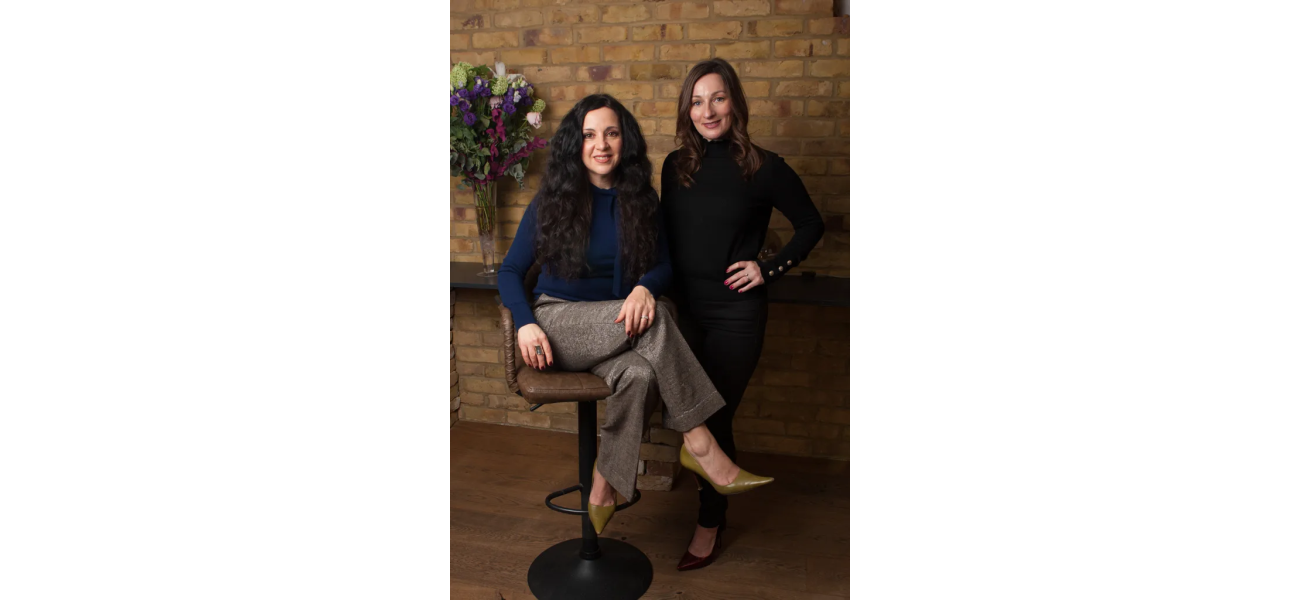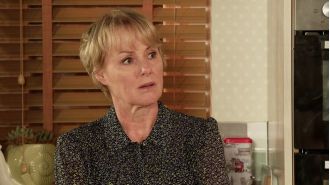Doctor's dismissal led to creation of personal menopause supplement made at home.
Two women from South-East London, aged 50, had to investigate their own health after doctors mistakenly diagnosed their menopause symptoms as anxiety.
October 18th 2024.

Myriam and Suzie, two close friends in their fifties, have always been passionate about health and wellness. However, they never expected to become pioneers in the world of menopause supplements. It all started when they began experiencing symptoms of menopause in their late thirties and early forties. From changes in energy levels and sleep patterns, to weight gain and mood swings, they were both struggling to understand what was happening to their bodies.
At first, neither Myriam nor Suzie had any knowledge about menopause. It was a topic that had never been discussed or taught to them, and they had never even heard of the term "perimenopause." As Myriam, a makeup artist from South-East London, recalls, "it simply wasn't on my radar." It seemed to be a taboo subject, with little information available. She had only heard about hot flashes as a common symptom, but that was the extent of her knowledge.
Suzie, who owns a tech PR firm, also from South-East London, adds, "as Gen Xers, no one ever spoke to us about menopause when we were younger. It was just assumed that you would experience a year of hot flashes at 50 and then everything would go back to normal." But as they both entered their late thirties and early forties, they began to experience more severe symptoms that they now know were signs of early menopause. Myriam struggled with sleep deprivation, fatigue, brain fog, and changes in her skin, hair, and nails, while Suzie battled low mood, weight gain, hot flashes, and anxiety.
Their paths crossed when Myriam, then 42, was hired to do Suzie's makeup for a celebrity event. Instantly, they hit it off and their friendship grew. They confided in each other about their struggles, and Myriam shared her symptoms with Suzie. In turn, Suzie opened up about her own experiences. They soon realized that they were not alone in their struggles.
As they bonded over their shared experiences, Myriam and Suzie also noticed how their symptoms were affecting their work and family life. As busy professionals, they both found that the constant fatigue and brain fog were hindering their productivity and focus. Myriam, who is always on the move with her makeup artist job, found it physically draining to carry heavy makeup cases on public transportation. Suzie, as a PR professional, struggled to maintain her high energy and extreme focus when faced with crippling fatigue and a hazy brain.
Their symptoms also had an impact on their family lives. Suzie, a single mother to two teenage daughters, felt withdrawn and less involved in family activities, which was completely out of character for her. Myriam, who is married with two sons, also found herself becoming more reactive and short-tempered, leading to conflicts with her family.
After multiple visits to the doctor, both Myriam and Suzie were diagnosed with perimenopause. However, the road to diagnosis and treatment was not easy. As Suzie explains, "I was 45 when I first went to the doctor for chronic fatigue. They suggested it might be perimenopause and did a blood test to check my hormone levels. But when it came back negative, I was left hanging." Suzie soon realized that blood tests are not always reliable, as hormone levels can vary from person to person and can change over time.
Feeling helpless and alone, Suzie turned to a private menopause clinic and was prescribed bio-identical hormones. However, when these did not work either, she felt like she had hit a dead end. It wasn't until she had her "eureka moment" and realized that her symptoms were textbook signs of menopause that she began to take matters into her own hands.
Myriam and Suzie were determined to find a way to alleviate their symptoms without traditional hormone replacement therapy (HRT). They delved into research on plant-based alternatives and became fascinated with the idea of "hacking" their hormones through the use of botanicals, vitamins, and supplements. As Suzie puts it, "plants are powerful healers," and they believed that by targeting their specific symptoms with different natural remedies, they could find relief.
Their research also led them to the connection between the gut microbiome and menopause. They learned that the gut plays a crucial role in regulating and recycling estrogen, and that a balance of gut microbes can help alleviate menopause symptoms. Armed with this knowledge, Myriam and Suzie were determined to find a solution that targeted both the physical and hormonal aspects of menopause.
Thus, Minerva was born. Myriam and Suzie created their own line of supplements from their kitchen table, using only the best natural ingredients. They tested out different combinations of botanicals, vitamins, and supplements until they found the perfect formula to combat their symptoms. Their goal was to help women like themselves, who were struggling to find relief from menopause symptoms.
While their journey was not easy, Myriam and Suzie are proud of what they have accomplished. They hope to bring awareness to the struggles of menopause and provide a natural alternative to traditional treatments. As they continue to expand their business, they are grateful for the opportunity to help others and make a positive impact in the world of women's health.
Myriam and Suzie are two women in their fifties who have been through a challenging experience with menopause. It all started when they were in their late thirties and early forties, respectively, and began noticing changes in their energy levels, sleep quality, weight, and mood. However, they didn't know what was happening to them at the time. Menopause was not a topic they had ever discussed or been taught about, and they had never even heard of the term "perimenopause."
Myriam, a makeup artist from South-East London, admits that she never even thought about menopause until it happened to her. It was never on her radar, and she felt like it was a taboo subject. She was aware that some women in midlife experienced hot flashes, but she didn't know much else about it. Similarly, Suzie, a tech PR firm owner from South-East London, says that being from the Gen X generation, they were never educated or talked to about menopause when they were younger. It was just assumed that when they hit 50, they would have a year of hot flashes and then everything would go back to normal.
Myriam remembers that when she was 42, she started experiencing more severe symptoms that she now knows were early signs of menopause. She struggled with sleep deprivation, fatigue, brain fog, and changes in her skin, hair, and nails. During this time, she happened to do Suzie's makeup for a celebrity event, and they instantly hit it off. As their friendship grew, they shared their struggles, including Myriam's symptoms. In turn, Suzie opened up about her own struggles with low mood, weight gain, hot flashes, and anxiety.
Both Myriam and Suzie found that their menopause symptoms had a significant impact on their jobs. Myriam, as a busy makeup artist, was constantly on the move, meeting clients and brides-to-be. She found that she would get tired much more easily, making her job physically draining. And the brain fog made her second-guess herself, so she had to be extra organized. Suzie, on the other hand, struggled with the high energy and extreme focus required for her job as a PR. When the fatigue and brain fog hit, she found it hard to concentrate and would even struggle in presentations, which was frustrating and made her feel self-conscious.
But it wasn't just their careers that were affected by their menopause symptoms; it also had an impact on their family lives. Both women found themselves becoming withdrawn or short-tempered, which caused tension in their relationships. Suzie, a single mother to two teenage daughters, noticed that she was feeling quieter and less involved, which was the opposite of her normal self. Her low energy and mood made it hard for her to join in on fun moments with her daughters. When they had a conversation about how menopause was affecting them as a family, there was more understanding and patience.
Similarly, Myriam, who is married and has two sons, found that her patience and tolerance were wearing thin. She would often react more intensely to her boys' loud and energetic behavior, and she would immediately feel guilty afterward. After multiple trips to the GP, Myriam and Suzie finally realized that they were in perimenopause. However, it wasn't an easy path to diagnosis or treatment.
Suzie went to the GP when she was 45, complaining of chronic fatigue. The doctor suggested that she might be in perimenopause and ordered a blood test to check her hormone levels. However, the test came back negative, leaving Suzie feeling uncertain and without any answers. She then went to a private clinic for a blood test, which also came back negative. Feeling frustrated and helpless, she finally went to a private menopause clinic and was prescribed "bio-identicals," which are plant-based hormones that are identical to the ones produced naturally in the body. But when they didn't work for her, Suzie felt like she had nowhere else to turn.
It was then that she had her "eureka moment" and realized that the symptoms she was experiencing were actually textbook signs of menopause. She became determined to find a solution to alleviate her symptoms. Similarly, Myriam also struggled with insomnia and anxiety, but her GP never mentioned a hormonal imbalance as a possible cause. She was shocked to think that thousands of women were being sent home with medication that didn't address the real cause of their menopause symptoms.
Unfortunately, Myriam and Suzie's experiences are not uncommon. A study found that while the majority of women reported difficult menopause symptoms, only 14% were given HRT, leaving 86% to deal with it on their own. Almost half of the women surveyed experienced three or more severe symptoms, with the most common being difficulty sleeping, brain fog, and anxiety or depression. Like many women, Myriam and Suzie were dismissed by their doctors as either anxious or simply "of a certain age." They were forced to become "health detectives," spending over £750 on treatments and potential cures.
They tried countless supplements, including the most well-known menopause supplements, as well as various plants and vitamins. However, they found that taking multiple supplements every day was not sustainable. So, they decided to dig deeper and focus on potential treatments that targeted specific symptoms. They had a shared passion for plant-based alternatives and wanted to avoid traditional HRT. They believed that plants were powerful healers and could provide relief from their menopause symptoms. They also discovered studies that linked the gut microbiome and menopause, where the estrobolome (collection of gut microbes) plays a role in regulating and recycling estrogen in the gut.
Myriam and Suzie were onto something game-changing, and they had a feeling that they were onto something big. They were determined to find a solution, and after much research and trial and error, they created Minerva, a supplement that combines various botanicals, vitamins, and supplements to target different menopause symptoms. They were confident that they could help other women going through the same struggles they did. And they were right; Minerva has helped numerous women find relief from their menopause symptoms.
At first, neither Myriam nor Suzie had any knowledge about menopause. It was a topic that had never been discussed or taught to them, and they had never even heard of the term "perimenopause." As Myriam, a makeup artist from South-East London, recalls, "it simply wasn't on my radar." It seemed to be a taboo subject, with little information available. She had only heard about hot flashes as a common symptom, but that was the extent of her knowledge.
Suzie, who owns a tech PR firm, also from South-East London, adds, "as Gen Xers, no one ever spoke to us about menopause when we were younger. It was just assumed that you would experience a year of hot flashes at 50 and then everything would go back to normal." But as they both entered their late thirties and early forties, they began to experience more severe symptoms that they now know were signs of early menopause. Myriam struggled with sleep deprivation, fatigue, brain fog, and changes in her skin, hair, and nails, while Suzie battled low mood, weight gain, hot flashes, and anxiety.
Their paths crossed when Myriam, then 42, was hired to do Suzie's makeup for a celebrity event. Instantly, they hit it off and their friendship grew. They confided in each other about their struggles, and Myriam shared her symptoms with Suzie. In turn, Suzie opened up about her own experiences. They soon realized that they were not alone in their struggles.
As they bonded over their shared experiences, Myriam and Suzie also noticed how their symptoms were affecting their work and family life. As busy professionals, they both found that the constant fatigue and brain fog were hindering their productivity and focus. Myriam, who is always on the move with her makeup artist job, found it physically draining to carry heavy makeup cases on public transportation. Suzie, as a PR professional, struggled to maintain her high energy and extreme focus when faced with crippling fatigue and a hazy brain.
Their symptoms also had an impact on their family lives. Suzie, a single mother to two teenage daughters, felt withdrawn and less involved in family activities, which was completely out of character for her. Myriam, who is married with two sons, also found herself becoming more reactive and short-tempered, leading to conflicts with her family.
After multiple visits to the doctor, both Myriam and Suzie were diagnosed with perimenopause. However, the road to diagnosis and treatment was not easy. As Suzie explains, "I was 45 when I first went to the doctor for chronic fatigue. They suggested it might be perimenopause and did a blood test to check my hormone levels. But when it came back negative, I was left hanging." Suzie soon realized that blood tests are not always reliable, as hormone levels can vary from person to person and can change over time.
Feeling helpless and alone, Suzie turned to a private menopause clinic and was prescribed bio-identical hormones. However, when these did not work either, she felt like she had hit a dead end. It wasn't until she had her "eureka moment" and realized that her symptoms were textbook signs of menopause that she began to take matters into her own hands.
Myriam and Suzie were determined to find a way to alleviate their symptoms without traditional hormone replacement therapy (HRT). They delved into research on plant-based alternatives and became fascinated with the idea of "hacking" their hormones through the use of botanicals, vitamins, and supplements. As Suzie puts it, "plants are powerful healers," and they believed that by targeting their specific symptoms with different natural remedies, they could find relief.
Their research also led them to the connection between the gut microbiome and menopause. They learned that the gut plays a crucial role in regulating and recycling estrogen, and that a balance of gut microbes can help alleviate menopause symptoms. Armed with this knowledge, Myriam and Suzie were determined to find a solution that targeted both the physical and hormonal aspects of menopause.
Thus, Minerva was born. Myriam and Suzie created their own line of supplements from their kitchen table, using only the best natural ingredients. They tested out different combinations of botanicals, vitamins, and supplements until they found the perfect formula to combat their symptoms. Their goal was to help women like themselves, who were struggling to find relief from menopause symptoms.
While their journey was not easy, Myriam and Suzie are proud of what they have accomplished. They hope to bring awareness to the struggles of menopause and provide a natural alternative to traditional treatments. As they continue to expand their business, they are grateful for the opportunity to help others and make a positive impact in the world of women's health.
Myriam and Suzie are two women in their fifties who have been through a challenging experience with menopause. It all started when they were in their late thirties and early forties, respectively, and began noticing changes in their energy levels, sleep quality, weight, and mood. However, they didn't know what was happening to them at the time. Menopause was not a topic they had ever discussed or been taught about, and they had never even heard of the term "perimenopause."
Myriam, a makeup artist from South-East London, admits that she never even thought about menopause until it happened to her. It was never on her radar, and she felt like it was a taboo subject. She was aware that some women in midlife experienced hot flashes, but she didn't know much else about it. Similarly, Suzie, a tech PR firm owner from South-East London, says that being from the Gen X generation, they were never educated or talked to about menopause when they were younger. It was just assumed that when they hit 50, they would have a year of hot flashes and then everything would go back to normal.
Myriam remembers that when she was 42, she started experiencing more severe symptoms that she now knows were early signs of menopause. She struggled with sleep deprivation, fatigue, brain fog, and changes in her skin, hair, and nails. During this time, she happened to do Suzie's makeup for a celebrity event, and they instantly hit it off. As their friendship grew, they shared their struggles, including Myriam's symptoms. In turn, Suzie opened up about her own struggles with low mood, weight gain, hot flashes, and anxiety.
Both Myriam and Suzie found that their menopause symptoms had a significant impact on their jobs. Myriam, as a busy makeup artist, was constantly on the move, meeting clients and brides-to-be. She found that she would get tired much more easily, making her job physically draining. And the brain fog made her second-guess herself, so she had to be extra organized. Suzie, on the other hand, struggled with the high energy and extreme focus required for her job as a PR. When the fatigue and brain fog hit, she found it hard to concentrate and would even struggle in presentations, which was frustrating and made her feel self-conscious.
But it wasn't just their careers that were affected by their menopause symptoms; it also had an impact on their family lives. Both women found themselves becoming withdrawn or short-tempered, which caused tension in their relationships. Suzie, a single mother to two teenage daughters, noticed that she was feeling quieter and less involved, which was the opposite of her normal self. Her low energy and mood made it hard for her to join in on fun moments with her daughters. When they had a conversation about how menopause was affecting them as a family, there was more understanding and patience.
Similarly, Myriam, who is married and has two sons, found that her patience and tolerance were wearing thin. She would often react more intensely to her boys' loud and energetic behavior, and she would immediately feel guilty afterward. After multiple trips to the GP, Myriam and Suzie finally realized that they were in perimenopause. However, it wasn't an easy path to diagnosis or treatment.
Suzie went to the GP when she was 45, complaining of chronic fatigue. The doctor suggested that she might be in perimenopause and ordered a blood test to check her hormone levels. However, the test came back negative, leaving Suzie feeling uncertain and without any answers. She then went to a private clinic for a blood test, which also came back negative. Feeling frustrated and helpless, she finally went to a private menopause clinic and was prescribed "bio-identicals," which are plant-based hormones that are identical to the ones produced naturally in the body. But when they didn't work for her, Suzie felt like she had nowhere else to turn.
It was then that she had her "eureka moment" and realized that the symptoms she was experiencing were actually textbook signs of menopause. She became determined to find a solution to alleviate her symptoms. Similarly, Myriam also struggled with insomnia and anxiety, but her GP never mentioned a hormonal imbalance as a possible cause. She was shocked to think that thousands of women were being sent home with medication that didn't address the real cause of their menopause symptoms.
Unfortunately, Myriam and Suzie's experiences are not uncommon. A study found that while the majority of women reported difficult menopause symptoms, only 14% were given HRT, leaving 86% to deal with it on their own. Almost half of the women surveyed experienced three or more severe symptoms, with the most common being difficulty sleeping, brain fog, and anxiety or depression. Like many women, Myriam and Suzie were dismissed by their doctors as either anxious or simply "of a certain age." They were forced to become "health detectives," spending over £750 on treatments and potential cures.
They tried countless supplements, including the most well-known menopause supplements, as well as various plants and vitamins. However, they found that taking multiple supplements every day was not sustainable. So, they decided to dig deeper and focus on potential treatments that targeted specific symptoms. They had a shared passion for plant-based alternatives and wanted to avoid traditional HRT. They believed that plants were powerful healers and could provide relief from their menopause symptoms. They also discovered studies that linked the gut microbiome and menopause, where the estrobolome (collection of gut microbes) plays a role in regulating and recycling estrogen in the gut.
Myriam and Suzie were onto something game-changing, and they had a feeling that they were onto something big. They were determined to find a solution, and after much research and trial and error, they created Minerva, a supplement that combines various botanicals, vitamins, and supplements to target different menopause symptoms. They were confident that they could help other women going through the same struggles they did. And they were right; Minerva has helped numerous women find relief from their menopause symptoms.
[This article has been trending online recently and has been generated with AI. Your feed is customized.]
[Generative AI is experimental.]
0
0
Submit Comment





